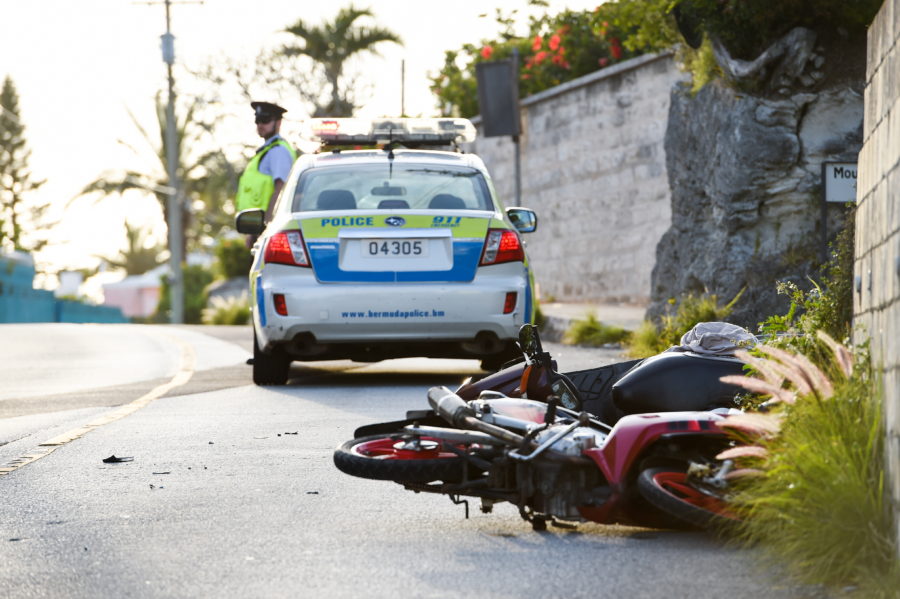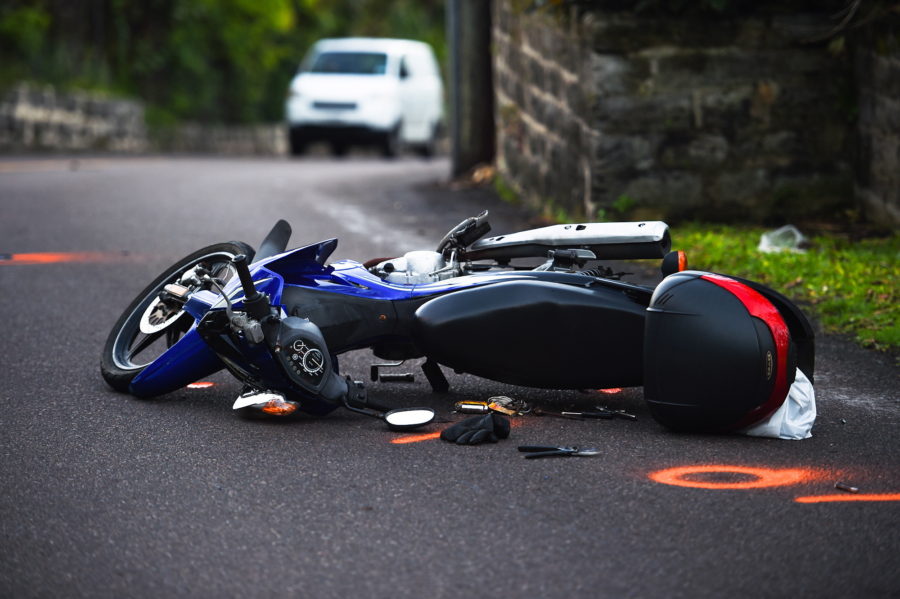Bermuda must not become desensitised to the number of road traffic accidents resulting in injury and loss of life.
Describing the statistic of having more than four people a day injured as a result of road collisions in 2016 as “shocking”, Ali Bardgett, chairwoman of the Bermuda Road Safety Council, said: “According to the Bermuda Health Council’s 2011 Health in Reviewreport, the age-standardised rate of traffic fatalities per 100,000 population was 28.2 in Bermuda, compared to 9.2 in countries belonging to the Organisation for Economic Cooperation (OECD),” she said.

“For males, the rate was 59.0 in Bermuda compared to 14.9 for OECD countries. The levels of injury are higher, and at huge cost both personally and for Bermuda’s infrastructure. With numbers like these, we cannot become desensitised — we need to be saddened enough to want to rectify the situation. This is everyone’s problem.”
Of that shocking statistic of having more than four people a day injured as a result of road collisions in 2016 Ms Bardgett said: “For such a small population, this is a shocking number, and disproportionate number of fatalities every year is even more concerning.
“According to a study by the former BRSC chairman, Dr Joseph Froncioni, in 2003 and 2004, for every one death there are over 200 injuries, 30 per cent are significant and require major hospitalisation and ongoing treatment. He refers to the ‘Iceberg Theory’ with the deaths being the tip of the iceberg and the vast number of injuries below the surface being mostly unseen by the general public.
“The cost to the island’s infrastructure is hard to estimate, but a new documentary titled A Piece of the Rockto raise awareness on the chronic issue of high incidences of road collisions and associated costs, they describe the situation as follows: “Over the ten year period from 2005 to 2014, there were 124 road related fatalities and over the five year period between 2009 and 2014, there were 11,246 road crashes [or 17 per cent of the population] that required emergency care at the Bermuda Hospital. The costs related to these road crashes were $17 million.”
Ms Bardgett said that 1,246 of those road crashes were categorised as “serious”, requiring the injured to spend on average eight days in hospital. “The additional costs related to the inpatient care for these serious crashes were an astronomical $20.4 million,” she said. “There are infrastructure and ancillary costs, as well as the expenses of the services that are called out when an accident occurs.”
Asked what the BRSC would like to see come about in 2017, she said: “The Minister of Transport tasked the BRSC to develop a Graduated Licensing Programme (GLP) for legislation and we have provided a draft proposal. The Ministry is also working on the introduction of speed cameras. The GLP is the foundation to improving road safety and speed cameras will help with enforcement.
“The GLP is for 16 to 18-year-olds and will be accredited by a recognised international standard. It will include on-road training with an instructor using helmets with a two-way radio and mic for constant communication whilst under instruction on the roads. We currently do not have any bike training on the road. Project Ride is confined to the car park at TCD and our 225km of paved roads now have over 47,000 vehicles for our newly licensed riders to navigate.
“We believe the lack of education of this standard is the result of the many of the problems we see daily on our roads. This comprehensive training, which has been standard for over 30 years in many other countries, will set the groundwork for changing riding behaviour.”
Drunk driving is also a major problem in Bermuda and Ms Bardgett said: “The culture of drinking and driving in Bermuda is still behind the times. We hear the argument that taxis aren’t available or we don’t have night buses. Our Junior Road Safety Council members tell us that it is normal for them to go to a party and throw their keys in to a bowl to be locked away if alcohol is present. They don’t let their friends have the keys to their bikes if they have been drinking. Sadly this thinking hasn’t reached everyone yet. Some of the older generations for example still think nothing to leaving a dinner party in their car after a few glasses of wine, beers or other alcoholic beverages.
“When the breathalyser came into force in the UK in 1967, the previous year had recorded the highest number of road fatalities at 7,985. Within two years a significant decline was achieved. By 1987, the government set the first national casualty reduction target. The target set was that road casualties should drop by one-third by the year 2000 in comparison to the average numbers for the years 1981 to 1985. The target was exceeded, with the number of fatalities dropping by 39 per cent and the number of serious injuries dropping by 45 per cent over that period.
“A huge cultural change was taking place through education and enforcement. Many of the local bars either closed or became gastropubs. The same happened when smoking was banned in public places. Thirty years on, nobody would dream of lighting up a cigarette in a bar or restaurant. Let’s hope it doesn’t take us another 30 years in Bermuda to tackle this problem and reduce the current, consistent rate of at least one road fatality per month.”
And during last year’s Throne Speech, Acting Governor Ginny Ferson revealed that roadside breath testing would be brought in this year.
To help stop the speeding on Bermuda’s roads, Ms Bardgett said that while they would like to see speed cameras installed, there were also other options, such as EVR (Electronic Vehicle Registration) systems.
“We already have the EVR sticker in our cars. This system was implemented in Bermuda by TCD in 2008. The technology has improved since then and probably is not as expensive now. EVR can be used with CCTV and automatic license plate recognition technology (ALPR). This technology has been around since the 1980s. Bangkok implemented this for speed detection two years ago via public and private partnerships (PPP or 3P). So far it has proven very successful, having a positive impact on the number of road deaths. This level of success is attributed to what experts agree is one of the most successful methods of ensuring safe driving; heightening the driving public’s perceived risk of apprehension by increasing the overall level of traffic surveillance. Using EVR in this way is less costly than increasing physical police presence, yet achieves the same goal.”
And the council would also like to see better training for tourists renting bikes. “The training should be tailored and offered to tourists including on-road training with a test required, for their own safety and that of other road users,” she said.
But to make Bermuda’s roads truly safe, she said that it was not just up to the Police, but also required a cultural change.
“We need targeted effort by all areas of responsibility, not just the Police using enforcement. It starts with education, personal responsibility and accountability, and enforcement. If you have never been taught how to ride a bike on a road and navigate traffic, it is a reasonable assumption that riders are going to copy what they see other riders doing — it is a self-perpetuating problem. We have to change the culture with this next generation being the change agents, leading the mission to save lives. We need to raise awareness of bad driving behaviour and the consequences of such bad behaviour that leads to the loss of life and severe injury.
This article was featured in the May 2017, RG Motor Express Magazine, now RG Motor.

